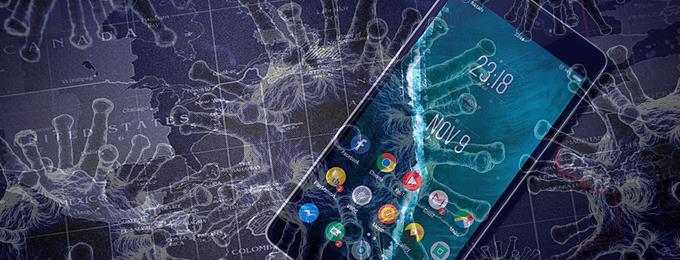The fight against COVID-19 has pushed AI instruments centre stage in the search for innovative ways to limit the spread and develop treatments and a vaccine.
In the past weeks, artificial intelligence (AI) has revealed its potential of becoming a successful tool to help tackle the COVID-19 crisis. The AI community, including AI researchers and experts, is working extensively on finding new and rapid ways in which AI can contribute. Since the beginning of the corona crisis, AI technologies are being used as a powerful tool to predict and track the spread, to help diagnose patients and to find therapeutics, and a vaccine.
AI-based diagnostics have been widely used already to quickly identify abnormal chest X-rays or to screen people for fever with AI-powered temperature screening systems. But they can also be used more creatively; a new AI mobile application will be launched soon called COVID-19 Sounds App. The App was invented by a group of researchers at the University of Cambridge led by Professor Cecilia Mascolo, who was awarded a EUR 2.5 million European Research Council (ERC) Advanced Grant in 2019. This mobile application will collect data to develop machine-learning algorithms that can detect whether a person is suffering from COVID-19 based on their coughing, voice and breathing sounds. AI might also play a crucial role in understanding SARS-CoV-2, the virus causing COVID-19, and paving a way for the development of a vaccine and treatments. Several organisations such as DeepMind have used AI to help predict and analyse the structure of proteins to have a better understanding of COVID-19 or are using AI algorithms to design new molecules, which could restrict the virus’ ability to replicate in cells. This process would usually take months or even longer, but with the help of AI the whole process is speeded up.
AI tools and technologies are now deployed not only to support efforts of the medical community, policy makers, and society in general, but also to monitor COVID-19 cases. The creation of an AI-powered COVID-19 watch by the Organisation for Economic Cooperation and Development (OECD), allows to follow the latest corona developments in real time. AI-based mathematical tools are playing an important role in understanding the spread of the virus and predicting its evolution over time, but they can also estimate the number of infections that are unreported by drawing data from the number of deaths. The highest priority for countries all over the world has been to limit the contagion, which has been supported by AI-powered early warning systems, contact tracing through mobile applications and even robots and drones that are deployed for medical deliveries, as well as, cleaning and sterilisation of hospital rooms and equipment.
Several initiatives have been put in place by the European Union to fully grasp the potential of using AI technology in the time of crisis. The AI-Robotics vs COVID-19 initiative of the European AI Alliance was launched by the European Commission (EC) to collect ideas about innovative immediately deployable AI and robotics solutions for the health care sector, which could be part of the common European response to the COVID-19 outbreak. It is possible to contribute to this initiative by either suggesting a solution, presenting an initiative or suggesting ideas via the dedicated European AI Alliance AI-Robotics vs COVID-19 forum. There are also funding opportunities to support some of these solutions and initiatives, for example, the Horizon 2020 project DIH-HERO. The Digital Innovation Hub Healthcare robotics (DIH-HERO) is a sustainable platform, which helps in the acceleration of innovation in robotics for healthcare by creating an open online portal to foster and facilitate collaboration. The DIH-HERO has launched an emergency open call with up to €5 million for projects to boost robotic solutions.
The large-scale deployment of AI across Europe might also bring up challenges, and data protection concerns have already been raised. During an online conference organised by Friends of Europe, a Brussels Think Tank, Margrethe Vestager, European Commission Executive Vice-President and Commissioner for Competition, stressed the importance of maintaining an ‘ecosystem of trust’ in AI and Robotics. Vestager called on the commitment to Europe’s General Data Protection Regulation (GDPR) and insisted on ensuring that technology is used in a transparent, accountable and trustworthy way. The notion of an ecosystem of trust was first introduced in a White Paper on AI released by the EC on 19 February 2020. The main goal of this ecosystem is to create a space where citizens support and trust engagement with AI applications. This becomes even more relevant during this crisis as multiple countries and the EU are working on launching a mobile app that could help ease lockdowns. The current goal of the Commission is to focus on a pan-European coordinated approach, which empowers citizens to use mobile applications for warning, preventing and contact tracing and to have a common approach for modeling and predicting the evolution of the spread of the virus through anonymised and aggregated mobile location data.
It remains unclear which AI technologies can be effective in combating COVID-19, but it is noteworthy that the exponential development and deployment of creative AI technologies during this crisis is unprecedented and emphasises the importance of research and innovation.

